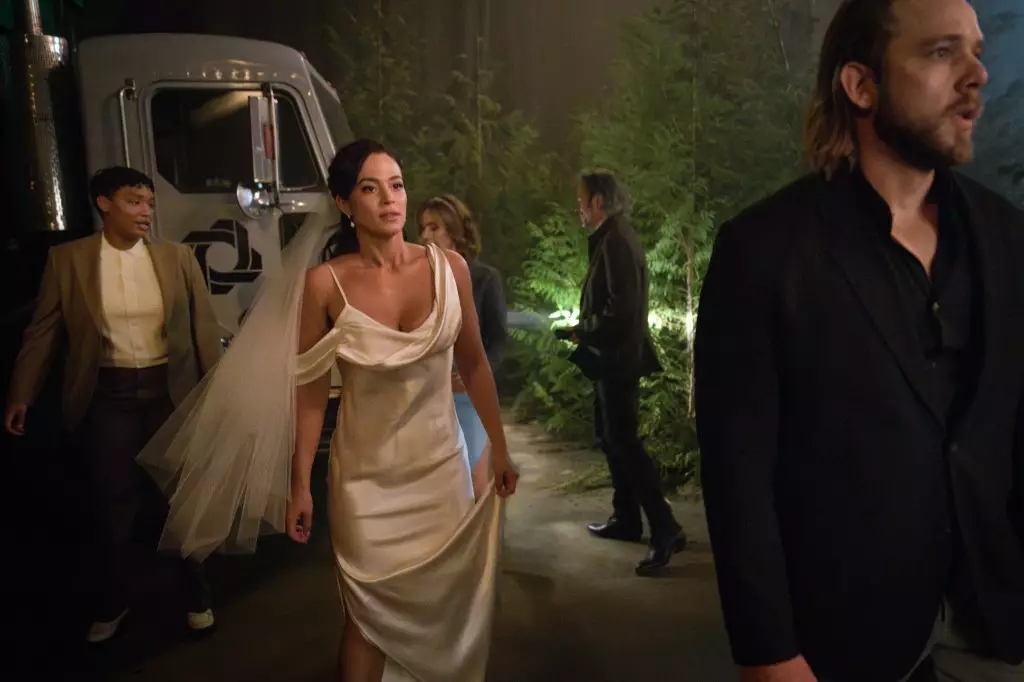The much-anticipated season 3 premiere of CBS’s *Fire Country*, titled “What the Bride Said,” sets the stage for a thrilling ride as it intertwines personal and dramatic elements with high stakes action. Despite the romantic backdrop of Diego and Gabriela’s wedding, the event swiftly transforms into a chaotic scenario—a helicopter crashes through the church’s stained glass window, leading to a narrative that balances soap opera dynamics with authentic firefighting heroism.
The episode starkly contrasts typical wedding narratives that viewers have come to expect. Instead of the traditional tale of romance and unity, this wedding showcases calamity as a prime plot driver. Showrunner Tia Napolitano mentioned that they wanted to create a memorable wedding scenario distinctly different from clichés. The brainstorm session that led to the helicopter crash signifies a bold commitment to creativity, where humor and action collide. In this instance, it’s not just about shattering glass—it’s about shattering expectations.
The inclusion of a helicopter crash, while inherently absurd, invigorates the plot and maintains viewer engagement. Napolitano adeptly weaves elements of suspense with the seriousness of first responders stepping up in unconventional situations, engaging in heroics even while dressed for celebration. The goal is to keep audiences invested in the characters’ journeys, even in situations that push realism to its brink.
One of the core tensions of the season is the complicated relationship between Manny, Gabriela’s father, and Bode, the love interest. The conflict is not merely a simple paternal disapproval; it reflects deeper emotional scars linked to past relationships and familial history. Manny’s opposition arises from a protective instinct—a desire to shield Gabriela from making mistakes that could echo his own troubled relationship with Roberta. Such character exploration adds richness to the narrative and demonstrates the show’s capacity to delve into emotional depths beyond simplistic drama.
Furthermore, Gabriela’s agency in the face of crisis invites discussion on gender roles in action scenarios. As she dons a wedding dress and embraces the chaos, her refusal to be relegated to a passive role amplifies the ongoing theme of personal strength prevalent in *Fire Country*.
The decision to split the premiere into a two-part episode receives considerable attention. Napolitano emphasizes the rich visual landscape created by the crew, showcasing a forest setting and intricate helicopter designs. The result is a setting that deserves thorough exploration. This approach allows the narrative to breathe and for plots and characters to develop organically over time.
With stunning visuals and sophisticated staging, the viewers are treated to a holistic storytelling experience that—while at times veering toward the theatrical—succeeds in creating an immersive world. Crafting a story that respects the audience’s time and attention reflects a mature approach to episodic narrative arcs.
As introduced in this season, the theme of legacy is pivotal. Bode’s journey as he comes to terms with his identity as both a firefighter and a member of the Leone family serves as a central axis around which various subplots revolve. The notion that heritage influences present choices captures the audience’s attention—not just as drama, but as a universal experience. Bode’s evolution from avoiding his roots to embracing them resonates with familial narratives across cultures.
This exploration of legacy extends beyond the Leones as new characters emerge, each potentially enriching the established lore of *Fire Country*. The addition of characters who interact with existing ones invites fresh dynamics and challenges, bringing opportunity for both tension and growth—key elements making the season compelling.
The arrival of Jared Padalecki’s Captain Casey signals an exciting shift, particularly with the prospect of spinoff series lurking near the horizon. The synergy between characters signals what could become a legacy of its own—one that fans will likely look forward to witnessing as it unfolds. Using established connections between shows creates a more engaging viewing experience, fostering a sense of community within the narrative universe.
Moreover, the inclusion of new characters indicates a willingness to branch out, promising a narrative exploration that could reveal unexpected alliances and rivalries, deepening the show’s complexity. As Tia Napolitano and her team unite distinct narratives, viewers can anticipate both thrills and heartfelt moments that solidify *Fire Country* as a staple of dramatic television.
The season’s premiere successfully marries drama, legacy, and a pulse-pounding action element, encapsulating everything that makes *Fire Country* stand out. Through bold choices and intricate character development, it sets a robust foundation for the stories that lie ahead.
